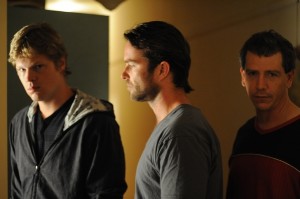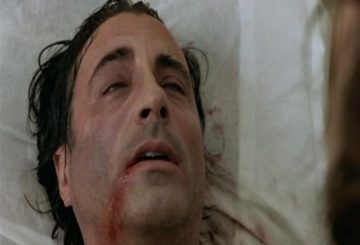Believe the hype: Animal Kingdom is one of the best Australian films of the decade writes Ian Shadwell…
Cinema loves the gangster life. It’s a genre in which the camera can explore a world without ordinary rules and instead capture those baser motivations – revenge, violence, fear, sex, and indeed, anything that bypasses the elaborate moralities of the real world. Such films are structured by vigilante codes of honor and desire in which morality is better understood as a function of the nervous system. It is the orchestration of this “visceral morality” that has made for some of the most compelling films in the history of cinema.
David Michod‘s Animal Kingdom is a powerful and evocative work that is firmly set in this tradition. Yet it eschews any of the glamour we typically associate with the cinematic outlaw and instead, examines, with a clinical detachment, the ferocious folly of revenge amongst a family of (sub)urban criminals. It is a raw, hard film devoid of the gloss of Hollywood’s version of such stories, yet it achieves its own kind of chilling poetry in the economy of its expression and most particularly a poignant characterisation of honor and revenge.
Set in ganglands Melbourne in the late eighties, it follows the actions of a family of criminals set upon by the “major crime squad” who are trying to solve a series of armed holdups. This is an Old Testament world of betrayal and revenge, within which the family, led by the sociopathically maternal “Smurf,” played with chilling authenticity by Jackie Weaver are at first united in their status as outlaws, before being ripped apart by the pressures of their outsider life.
The three sons: Pope (Ben Mendelsohn), Craig (Sullivan Stapleton) and Darren (Luke Ford), are bound together by their status, living in a world dictated by a brutal code of honor, but more particularly, underwritten by a sinister, psychotic malevolence – present particularly in the instance of Pope and the drug induced paranoia of Craig, which allows them the freedom to enforce their own standards of morality. A morality more akin to the Darwinian world than 1980’s Melbourne.
Michod introduces into this violent underworld, the character of Jay, less an innocent, than a blank, numbed to the world by an upbringing devoid of feeling. We are alerted to this by an incredibly spare and brilliant opening, that not only illustrates Jay’s state of mind, but assures us that we are in the hands of an auteur who understands film at a deep level. Indeed Michod’s economy of expression is one of the standout features of a film that could easily have been ruined by the histrionic.
If this film is anything, it is a master class in writing, within which Michod manipulates Jay’s character as the central point in a world of constantly shifting alliance. By maintaining Jay as a bleakly mute witness to the horrors that surround him, he both provides us with a means of examining the morality of this tale through the eyes of an innocent, and an effective device for hiding the permutations of the narrative, ensuring that we are always surprised. Satisfyingly, each twist in this complex story is in retrospect the inevitable outcome of the situation these characters find themselves in. It is this congruence between character and plot that is perhaps the most gratifying aspect of the film. It is rare at any level to find something that has been thought through so deeply.
Aside from the writing, the cast are, for the most part, assured in their performances, bringing nuance and texture to each part. Though much has been said about the performance of the three brothers, and deservedly so, the performances of Clayton Jackobson and Susan Prior as the parents of Nicky are outstanding counterpoints to the lunatic ferocity of the brothers. Their portrayal of a suburban family is pitched perfectly in an understated performance that provides the moral counterweight to the darkness of Pope. Jackie Weaver’s Smurf is also played with a stunningly authentic edge and a rising intensity that brilliantly accentuates the strength of the blood ties that motivate much of the action in the film. Similarly Jay is performed with audacious restraint by newcomer James Frecheville. He doesn’t so much bring his character alive as allow his passivity to become the fulcrum of the film’s expression. It is not until we are deeply into the plot that we become aware of the depths brewing within him. Its a remarkable performance and a stunning debut.
Animal Kingdom is certainly the best Australian film I have seen in a very long time. It is fierce, thoughtful, powerful cinema that is at once universal and local. Certainly worth a night out at the flicks.



